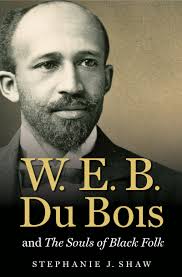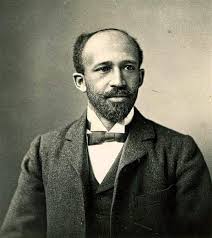The Souls of Black Folk Page #38
The Souls of Black Folk is a 1903 work of American literature by W. E. B. Du Bois. It is a seminal work in the history of sociology and a cornerstone of African-American literature. The book contains several essays on race, some of which the magazine Atlantic Monthly had previously published.
This unfortunate economic situation does not mean the hindrance of all advance in the black South, or the absence of a class of black landlords and mechanics who, in spite of disadvantages, are accumulating property and making good citizens. But it does mean that this class is not nearly so large as a fairer economic system might easily make it, that those who survive in the competition are handicapped so as to accomplish much less than they deserve to, and that, above all, the personnel of the successful class is left to chance and accident, and not to any intelligent culling or reasonable methods of selection. As a remedy for this, there is but one possible procedure. We must accept some of the race prejudice in the South as a fact,—deplorable in its intensity, unfortunate in results, and dangerous for the future, but nevertheless a hard fact which only time can efface. We cannot hope, then, in this generation, or for several generations, that the mass of the whites can be brought to assume that close sympathetic and self-sacrificing leadership of the blacks which their present situation so eloquently demands. Such leadership, such social teaching and example, must come from the blacks themselves. For some time men doubted as to whether the Negro could develop such leaders; but to-day no one seriously disputes the capability of individual Negroes to assimilate the culture and common sense of modern civilization, and to pass it on, to some extent at least, to their fellows. If this is true, then here is the path out of the economic situation, and here is the imperative demand for trained Negro leaders of character and intelligence,—men of skill, men of light and leading, college-bred men, black captains of industry, and missionaries of culture; men who thoroughly comprehend and know modern civilization, and can take hold of Negro communities and raise and train them by force of precept and example, deep sympathy, and the inspiration of common blood and ideals. But if such men are to be effective they must have some power,—they must be backed by the best public opinion of these communities, and able to wield for their objects and aims such weapons as the experience of the world has taught are indispensable to human progress. Of such weapons the greatest, perhaps, in the modern world is the power of the ballot; and this brings me to a consideration of the third form of contact between whites and blacks in the South,—political activity. In the attitude of the American mind toward Negro suffrage can be traced with unusual accuracy the prevalent conceptions of government. In the fifties we were near enough the echoes of the French Revolution to believe pretty thoroughly in universal suffrage. We argued, as we thought then rather logically, that no social class was so good, so true, and so disinterested as to be trusted wholly with the political destiny of its neighbors; that in every state the best arbiters of their own welfare are the persons directly affected; consequently that it is only by arming every hand with a ballot,—with the right to have a voice in the policy of the state,—that the greatest good to the greatest number could be attained. To be sure, there were objections to these arguments, but we thought we had answered them tersely and convincingly; if some one complained of the ignorance of voters, we answered, “Educate them.” If another complained of their venality, we replied, “Disfranchise them or put them in jail.” And, finally, to the men who feared demagogues and the natural perversity of some human beings we insisted that time and bitter experience would teach the most hardheaded. It was at this time that the question of Negro suffrage in the South was raised. Here was a defenceless people suddenly made free. How were they to be protected from those who did not believe in their freedom and were determined to thwart it? Not by force, said the North; not by government guardianship, said the South; then by the ballot, the sole and legitimate defence of a free people, said the Common Sense of the Nation. No one thought, at the time, that the ex-slaves could use the ballot intelligently or very effectively; but they did think that the possession of so great power by a great class in the nation would compel their fellows to educate this class to its intelligent use. Meantime, new thoughts came to the nation: the inevitable period of moral retrogression and political trickery that ever follows in the wake of war overtook us. So flagrant became the political scandals that reputable men began to leave politics alone, and politics consequently became disreputable. Men began to pride themselves on having nothing to do with their own government, and to agree tacitly with those who regarded public office as a private perquisite. In this state of mind it became easy to wink at the suppression of the Negro vote in the South, and to advise self-respecting Negroes to leave politics entirely alone. The decent and reputable citizens of the North who neglected their own civic duties grew hilarious over the exaggerated importance with which the Negro regarded the franchise. Thus it easily happened that more and more the better class of Negroes followed the advice from abroad and the pressure from home, and took no further interest in politics, leaving to the careless and the venal of their race the exercise of their rights as voters. The black vote that still remained was not trained and educated, but further debauched by open and unblushing bribery, or force and fraud; until the Negro voter was thoroughly inoculated with the idea that politics was a method of private gain by disreputable means.
Translation
Translate and read this book in other languages:
Select another language:
- - Select -
- 简体中文 (Chinese - Simplified)
- 繁體中文 (Chinese - Traditional)
- Español (Spanish)
- Esperanto (Esperanto)
- 日本語 (Japanese)
- Português (Portuguese)
- Deutsch (German)
- العربية (Arabic)
- Français (French)
- Русский (Russian)
- ಕನ್ನಡ (Kannada)
- 한국어 (Korean)
- עברית (Hebrew)
- Gaeilge (Irish)
- Українська (Ukrainian)
- اردو (Urdu)
- Magyar (Hungarian)
- मानक हिन्दी (Hindi)
- Indonesia (Indonesian)
- Italiano (Italian)
- தமிழ் (Tamil)
- Türkçe (Turkish)
- తెలుగు (Telugu)
- ภาษาไทย (Thai)
- Tiếng Việt (Vietnamese)
- Čeština (Czech)
- Polski (Polish)
- Bahasa Indonesia (Indonesian)
- Românește (Romanian)
- Nederlands (Dutch)
- Ελληνικά (Greek)
- Latinum (Latin)
- Svenska (Swedish)
- Dansk (Danish)
- Suomi (Finnish)
- فارسی (Persian)
- ייִדיש (Yiddish)
- հայերեն (Armenian)
- Norsk (Norwegian)
- English (English)
Citation
Use the citation below to add this book to your bibliography:
Style:MLAChicagoAPA
"The Souls of Black Folk Books." Literature.com. STANDS4 LLC, 2025. Web. 11 Jan. 2025. <https://www.literature.com/book/the_souls_of_black_folk_310>.




Discuss this The Souls of Black Folk book with the community:
Report Comment
We're doing our best to make sure our content is useful, accurate and safe.
If by any chance you spot an inappropriate comment while navigating through our website please use this form to let us know, and we'll take care of it shortly.
Attachment
You need to be logged in to favorite.
Log In